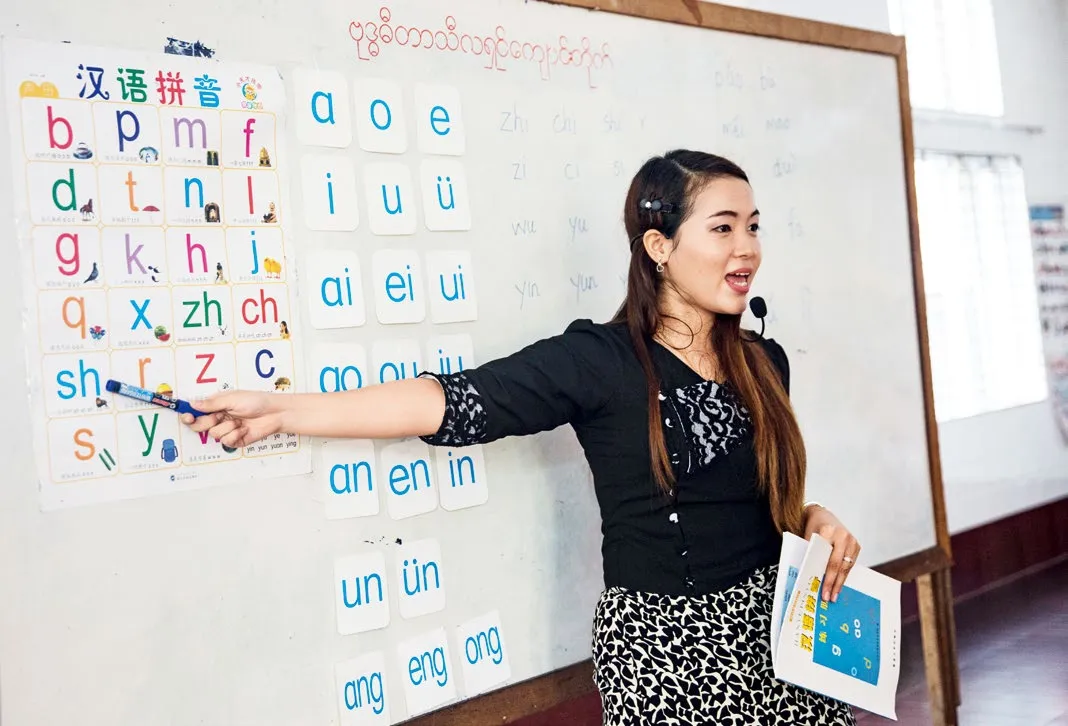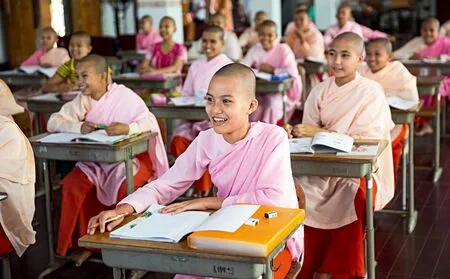Chinese Learning at A Yangon Temple
2017-07-18By
By
Chinese Learning at A Yangon Temple
ByWang Fengjuan
Disadvantaged girls in Myanmar’s largest city benefit from charitable work giving them greater access to educational opportunities

Chau Eindayae, a teacher at YNLC, has volunteered teaching Chinese at Buddha Ditar every Tuesday and Saturday since Chinese classes were first offered at the temple.
“Come on”, “Run”, “Line up” were heard in Chinese at Buddha Ditar temple in Yangon, Myanmar, as reporters visited on May 3. Those reading aloud were not young Myanmar students learning Chinese, but 30 nuns adorned in pink robes, reciting under the instruction of their teacher.
Temples in Myanmar often also serve as local schools. Buddha Ditar in North Okkalapa, one of the largest northern districts in the outskirts of Yangon, is one of the 228 temple schools that exist in Myanmar. The temple was established by three female abbots, and apart from taking in 30 nuns, it has also adopted over 40 girls who come from split families or remote mountain villages, or have been orphaned. The three founding female abbots offer them shelter, food and clothing. However, the abbots have felt frustrated that they are not able to offer good education.
Origin of Chinese Classroom
In response to the lack of educational opportunities at the temple, Jiang Qiying, principal of the Yangon Noble Language Center (YNLC), decided to offer free education for the girls at Buddha Ditar, including practical Chinese classes. YNLC and Buddha Ditar reached an agreement on Nov. 5, 2016, and classes began shortly thereafter.
Jiang said that YNLC, as a school developing in Myanmar, hopes to comprehensively integrate into Myanmar’s development in terms of social, economic, cultural and educational projects. Jiang said that YNLC chose Buddha Ditar as its target for cooperation because as most of YNLC’s teachers are female, they were a good fit to teach Buddha Ditar’s nuns and young girls.
Buddha Ditar’s female abbots said that their cooperation with YNLC represents a rare opportunity for learning and hopes both the nuns and young girls living there can take their Chinese studies extremely seriously. Free Chinese classes can not only enrich girls’skills but also provide more opportunities for them to find jobs later in life.
‘I Love to Learn Chinese!’
Chau Eindayae, also known by her Chinese name Su Xuerong, is a teacher with YNLC. She has taught Chinese at Buddha Ditar every Tuesday and Saturday since Chinese classes at the temple began. Her grandparents moved to Myanmar from China and she has extensive experience in bilingual teaching of Chinese and Myanmar language. She formulated customized teaching plans for her class at Buddha Ditar, and the tailor-made teaching plans focus on how to improve the girls’ interest when it comes to Chinese learning, as well as enhance their practical communication skills.
Chau Eindayae, who often wears a Longyi (an attire composed of a sheet of cloth, widely worn in Myanmar), likes to conduct interactive teaching in front of a blackboard with her students. When she taught the word “run”, she simultaneously made a running motion. When the students learned the word“beard”, Chau Eindayae smiled and asked “where are beards?”The young students laughed and touched their chins. One day, when the outsidetemperature reached nearly 40 degrees Celsius and there was a temporary power blackout —despite being in a spacious and ventilated classroom — everyone in attendance began to sweat profusely. But Chau Eindayae remained patient, walking her students through their latest vocabulary list.

In the Chinese class at Buddha Ditar, students listen attentively and enjoy interacting with their teacher.
After class, students chatted with the attending Chinese reporters in Chinese. “Hello”, “I love to learn Chinese” and “Have you eaten?”, they exclaimed. Naw Aye Chan May, an orphan adopted by Buddha Ditar who is now in her first year of university, has participated in the Chinese class at the temple since it was first offered. She hopes to constantly enrich her knowledge so as to create more opportunities for herself in the future.
On the second floor of the temple is the dormitory, where two slightly older nuns were fiddling with several newspapers on the floor. When asked what was the purpose of the newspaper, they responded shyly. As they have taught themselves tailoring, they planned to use the newspaper to formulate the first draft for a new garment. They planned to make a new set of Longyi for teacher Chau Eindayae.
During the interview, one of the three female abbots said that she has been encouraging the girls to cherish this rare learning opportunity and asked them to try to master the language of Chinese, so that they could become selfreliant after leaving the temple when they grow up. The female abbot’s intention also coincides with the wish of the head of YNLC, who hopes the girls can benefit from promising future prospects and eventually give back to the temple that raised them.
Passing Down the Love
The Buddhist prayer room that the girls use for reciting scripture is on the third floor of the temple. There is an LCD TV in the spacious foyer, which is used for recreational activities, and the TV is a valuable resource for the children to access education, information, as well as entertainment. One of the abbots told us that as now is the time of summer holidays in Myanmar, the children attend Chinese lessons in the morning and watch TV programs in the afternoon. When asked which type of TV program is the girls’ favorite, the abbot said they love cartoons.
Buddha Ditar’s TV was donated by “One Temple, One TV”, a charity project initiated and funded by the Yunnan International Non-Government Organization Society and organized by YNLC. The combined first and second phases of the project are set to benefit 228 temples in and around Yangon.
YNLC plans to offer an opportunity to girls particularly interested in Chinese language learning to become Chinese teachers themselves. There are also plans to send these girls to China for future study.
Jiang said that YNLC hopes to develop more public welfare projects in the future. Such projects include the promotion of educational charity projects in order to offer a greater number of children studying in temples in Yangon access to education in Chinese, English and computer science. They also plan to launch nutrition programs to improve the children’s health.
